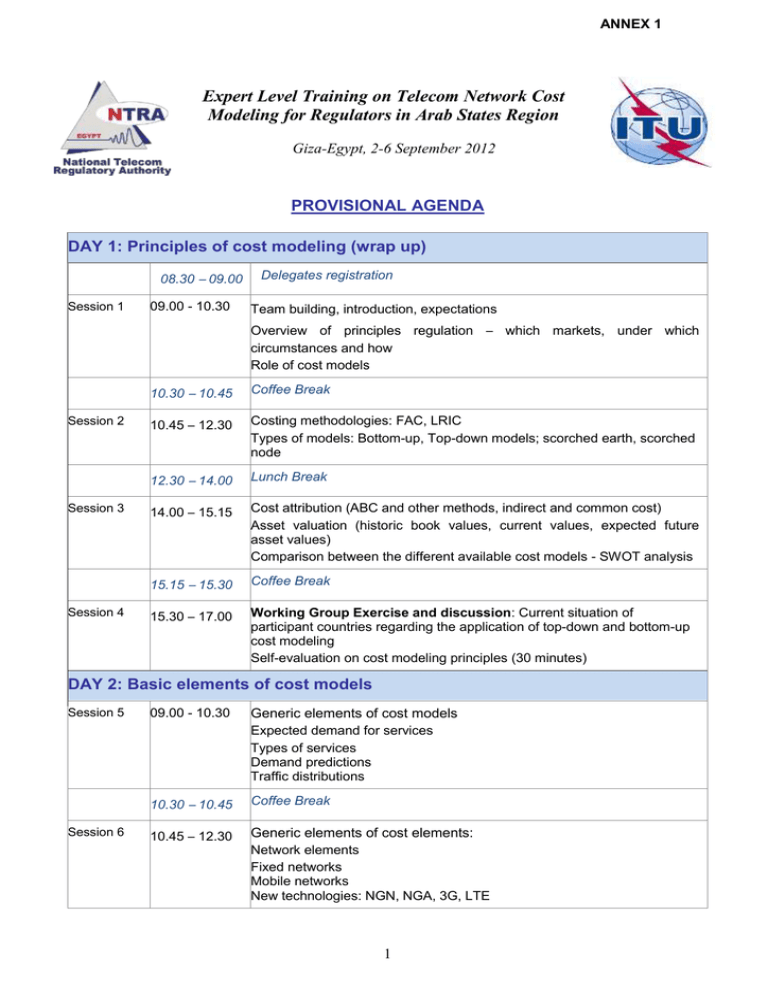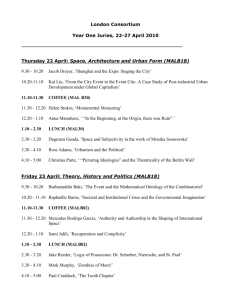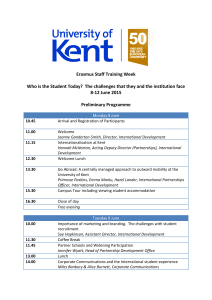Expert Level Training on Telecom Network Cost PROVISIONAL AGENDA
advertisement

ANNEX 1 Expert Level Training on Telecom Network Cost Modeling for Regulators in Arab States Region Giza-Egypt, 2-6 September 2012 PROVISIONAL AGENDA DAY 1: Principles of cost modeling (wrap up) 08.30 – 09.00 Session 1 09.00 - 10.30 Delegates registration Team building, introduction, expectations Overview of principles regulation – which markets, under which circumstances and how Role of cost models Session 2 Session 3 Session 4 10.30 – 10.45 Coffee Break 10.45 – 12.30 Costing methodologies: FAC, LRIC Types of models: Bottom-up, Top-down models; scorched earth, scorched node 12.30 – 14.00 Lunch Break 14.00 – 15.15 Cost attribution (ABC and other methods, indirect and common cost) Asset valuation (historic book values, current values, expected future asset values) Comparison between the different available cost models - SWOT analysis 15.15 – 15.30 Coffee Break 15.30 – 17.00 Working Group Exercise and discussion: Current situation of participant countries regarding the application of top-down and bottom-up cost modeling Self-evaluation on cost modeling principles (30 minutes) DAY 2: Basic elements of cost models Session 5 Session 6 09.00 - 10.30 Generic elements of cost models Expected demand for services Types of services Demand predictions Traffic distributions 10.30 – 10.45 Coffee Break 10.45 – 12.30 Generic elements of cost elements: Network elements Fixed networks Mobile networks New technologies: NGN, NGA, 3G, LTE 1 12.30 – 14.00 Session 7 Session 8 Lunch Break 14.00 – 15.15 Generic elements of cost models Network design and determination Capex for network elements Data collection issues 15.15 – 15.30 Coffee Break 15.30 – 17.00 Working Group Exercise and discussion: Specifying cost models covering the topics of Day 2 DAY 3: Dimensioning a mobile network for a sample PC based bottom up model Session 9 Session 10 Session 11 Session 12 09.00 – 10.30 Introducing the training cost model Traffic predictions in minutes - Billed minutes vs. technical minutes Busy hour and Erlang conversion - Coverage and capacity 10.30 – 10.45 Coffee Break 10.45 – 12.30 Dimensioning of basic network elements Quality of service parameters and network dimensioning Switches, registers, BTS, BSC and TRX - Transmission Other Routing table - Technical background 12.30 – 14.00 Lunch Break 14.00 – 15.15 Derivation of network costs of services 15.15 – 15.30 Coffee Break 15.30 – 17.00 Working Group Exercise and discussion: Data input into the cost training model and development and determination of specific data based on a case study 2 DAY 4: Cost allocation and tariff calculation Session 13 Session 14 Session 15 Session 16 9.00 – 10.30 Working Group Exercise and discussion: Data input into the cost training model and development and determination of specific data based on a case study(cont.) Special session: participants should have the opportunity to ask for any additional topics on costing not included in the agenda 10.10 – 10.45 Coffee Break 10.45 – 12.30 Working Group Exercise and discussion: using the cost training model and developing scenarios that reflect different costs and cost allocations 12.30 – 14.00 Lunch Break 14.00 – 15.15 Working Group Exercise Experimenting with different parameter values (case studies) Experimenting with deferent data sets (case studies) 15.15 – 15.30 Coffee break 15.30 – 17.00 Presentations by each Working Group to the plenary – Discussion/Critiques) DAY 5: Exercises with the computer training cost model Session 17 Session 18 Session 19 09.00 – 10.30 Special aspects of cost models: WACC - determination of WACC of non listed companies, divisional WACC Different depreciation profiles (straight line vs. tilted annuity vs. others) Different capital maintenance concepts (FCM vs. OCM) How to get replacement values (GRV and Modern Equivalent Assets) 10.30 – 10.45 Coffee Break 10.45 – 12.30 Cost of network elements (direct, indirect, common and special costs) Operating costs - Capital costs Attribution of costs between services provided Tariff calculation Use of models for National Broadband Network (NBN), Next Generation Networks (NGN) and converged services 12.30 – 14.00 Lunch Break 14.00 – 15.15 Open discussion and Wrap up Closing ceremony and delivery of Certificates Facilitator’s Profile: - Mr. Heinrich Otruba, Former President of the Austrian Regulatory Authority RTR, now CEO of IRAC Est. specialized Agency for international regulatory questions, Professor at the Vienna University. 3 - Mr. Mark Spracklen, Project Manager/adviser on several major Financial, Regulatory Cost and Profitability implementations for Customer Segmentation, Pricing and campaign tracking, which include extracting data from the Network (CDR’s). 4

